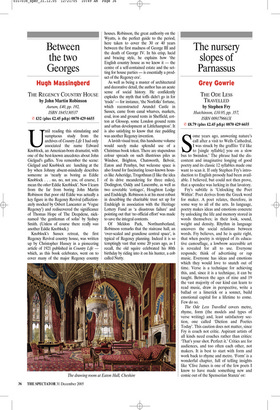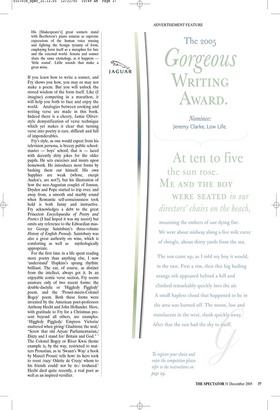The nursery slopes of Parnassus
Grey Gowrie
THE ODE LESS TRAVELLED by Stephen Fry Hutchinson, £10.95, pp. 357, ISBN 009179661X ✆ £8.79 (plus £2.45 p&p) 0870 429 6655 Some years ago, answering nature’s call after a visit to Wells Cathedral, I was struck by the graffito ‘I’d like to [single syllable] you on a slow bus to Swindon.’ The phrase had the discontent and imaginative longing of good poetry and its classic 12 syllables made one want to scan it. If only Stephen Fry’s introduction to English prosody had been available. I believed, but could not then prove, that a spondee was lurking in that lavatory.
Fry’s subtitle is ‘Unlocking the Poet Within’. Poet derives from the Greek word for maker. A poet relates, therefore, in some way to all of the arts. In language, poetry makes ideas and emotions concrete by unlocking the life and memory stored in words themselves; in their look, sound, weight and density. Rhythm in language uncovers the social relations between words. Fry believes, and he is quite right, that when poetry is stripped of its educative camouflage, a lowbrow accessible art is revealed for all to use. Everyone responds; think of advertising or rap music. Everyone has ideas and emotions which they would love to snatch out of time. Verse is a technique for achieving this, and, since it is a technique, it can be taught. Between the ages of nine and 19 the vast majority of our kind can learn to read music, draw in perspective, write a ballad or a limerick or a sonnet, build emotional capital for a lifetime to come. Few do so.
The Ode Less Travelled covers metre, rhyme, form (the models and types of verse writing) and, least satisfactory section, one called ‘Diction and Poetics Today’. This caution does not matter, since Fry is coach not critic. Aspirant artists of all kinds need coaches rather than critics: ‘That’s your shot. Perfect it.’ Critics are for audiences, and too often each other, not makers. It is best to start with form and work back to rhyme and metre. ‘Form’ is a wonderful chapter, full of telling insights like ‘Clive James is one of the few poets I know to have made something new and comic out of the Spenserian Stanza’ or:
His [Shakespeare’s] great sonnets stand with Beethoven’s piano sonatas as supreme expressions of the human voice musing and fighting the benign tyranny of form, employing form itself as a metaphor for fate and the external world. Sonata and sonnet share the same etymology, as it happens — ‘little sound’. Little sounds that make a great noise.
If you learn how to write a sonnet, and Fry shows you how, you may or may not make a poem. But you will unlock the stored wisdom of the form itself. Like (I imagine) competing in a marathon, it will help you both to face and enjoy the world. Analogies between cooking and writing verse are made in this book. Indeed there is a cheery, Jamie Oliverstyle demystification of verse technique which yet makes it clear that turning verse into poetry is rare, difficult and full of imponderables.
Fry’s style, as one would expect from his television persona, is breezy public schoolmaster — boys’ school, that is — laced with decently dirty jokes for the older pupils. He sets exercises and insists upon homework. He introduces most forms by bashing them out himself. His own Sapphics are weak (whose, except Auden’s, are not?), but his illustration of how the neo-Augustan couplet of Jonson, Dryden and Pope started to trip over, and away from, a smooth and marbly sound when Romantic self-consciousness took hold is both funny and instructive. Fry acknowledges a debt to the great Princeton Encyclopaedia of Poetry and Poetics (I had hoped it was my secret) but omits any reference to the Edwardian master George Saintsbury’s three-volume History of English Prosody. Saintsbury was also a great authority on wine, which is comforting as well as mythologically appropriate.
For the first time in a life spent reading more poetry than anything else, I now ‘understand’ Hopkins’s sprung rhythm: brilliant. The ear, of course, as distinct from the intellect, always got it. In an enjoyable comic verse section, Fry seems unaware only of two recent forms: the double-dactylic or ‘Higgledy Piggledy’ poem, and the ‘Proust-meets-Colonel Bogey’ poem. Both these forms were invented by the American poet-professors Anthony Hecht and John Hollander. Here, with gratitude to Fry for a Christmas present beyond all others, are examples. ‘Higgledy Piggledy/ Empress Victoria/ muttered when giving/ Gladstone the nod,/ “Screw that old Aryan/ Parliamentarian,/ Dizzy and I stand for/ Britain and God.” ’ The Colonel Bogey or River Kwai theme example is, by the way, restricted to matters Proustian, as in ‘Swann’s Way/ a book by Marcel Proust/ tells how/ its hero took to roost /racy/ Odette de Crecy/ whom to his friends could/ not be in-/ troduced.’ Hecht died quite recently, a real poet as well as an inspired versifier.


















































 Previous page
Previous page